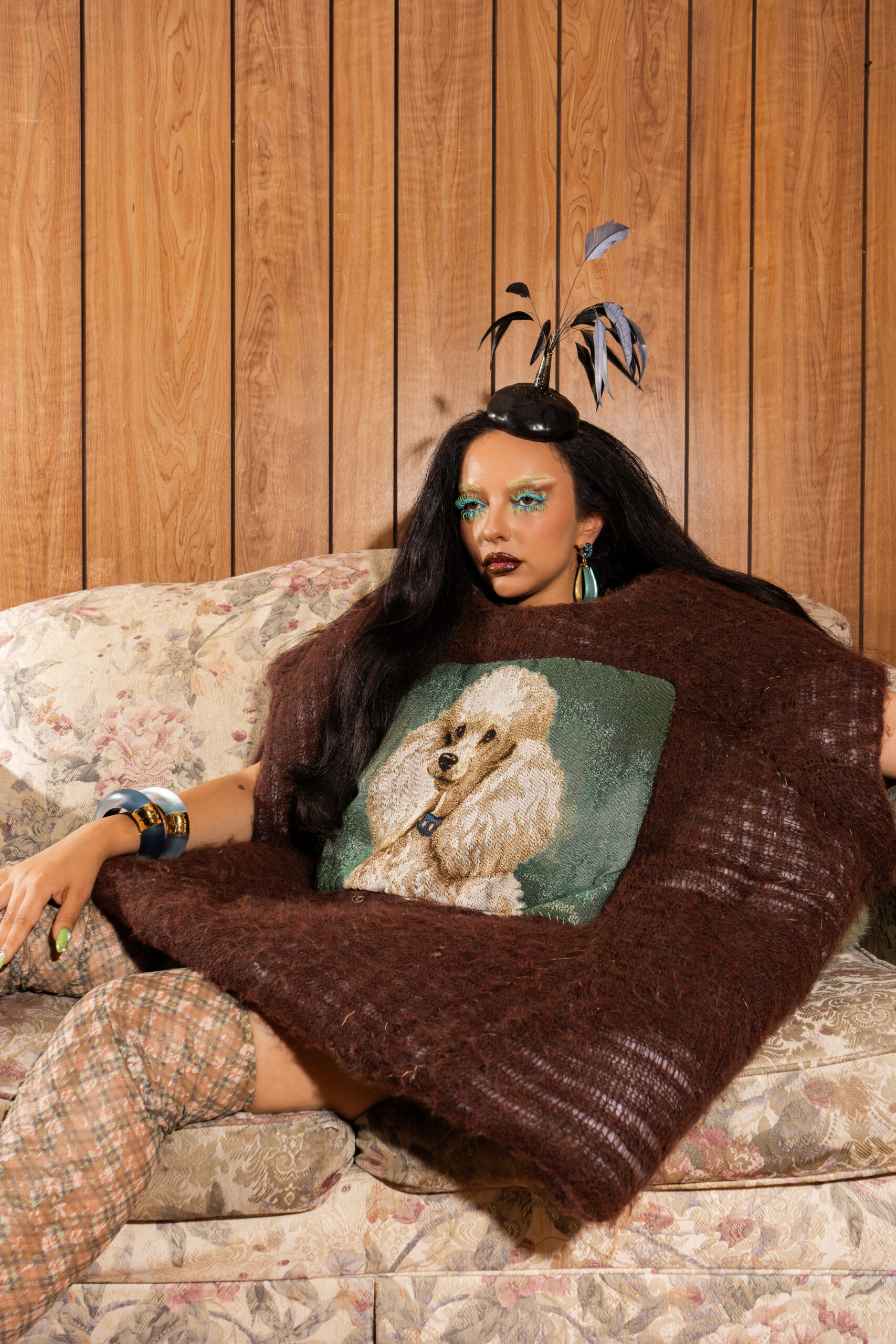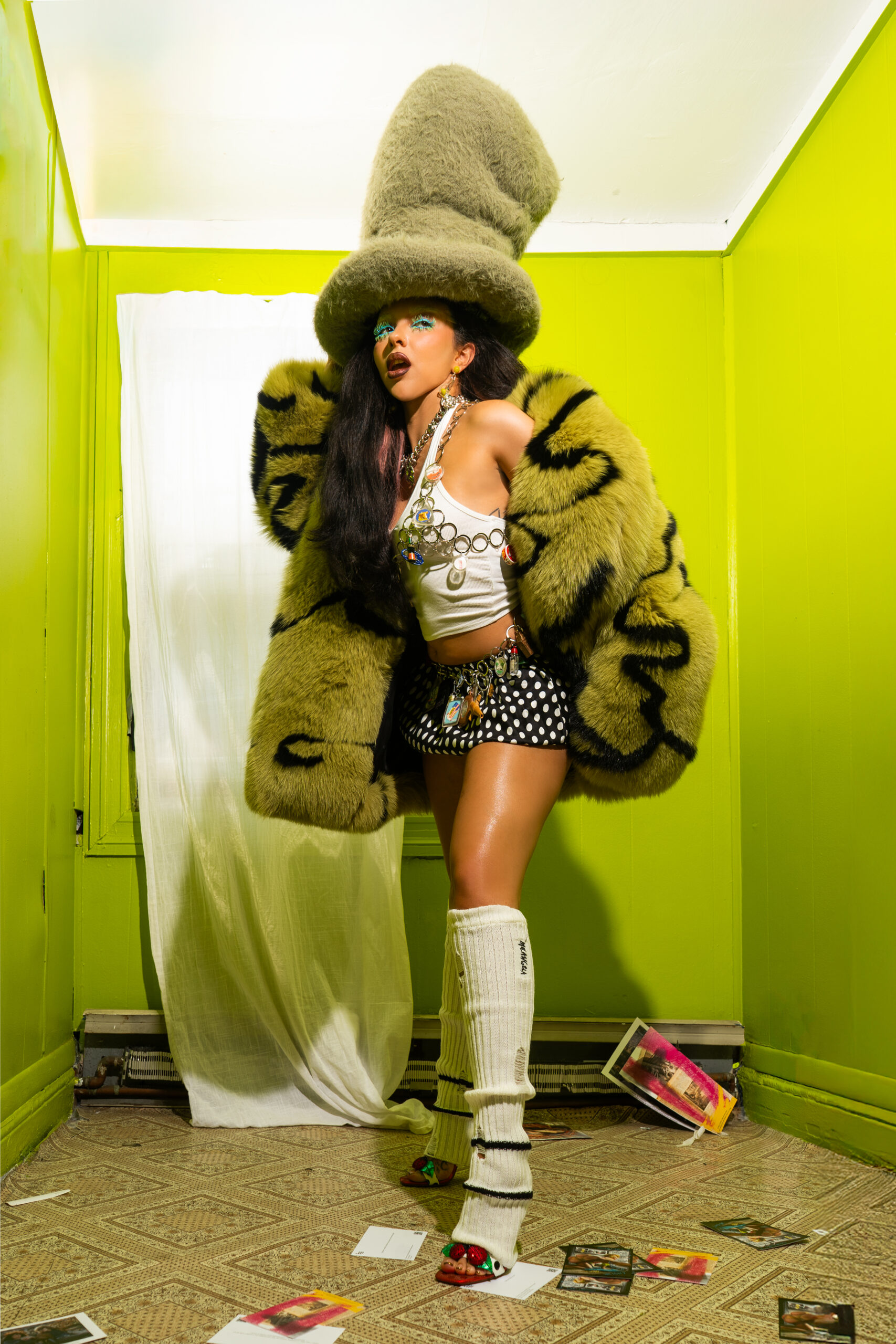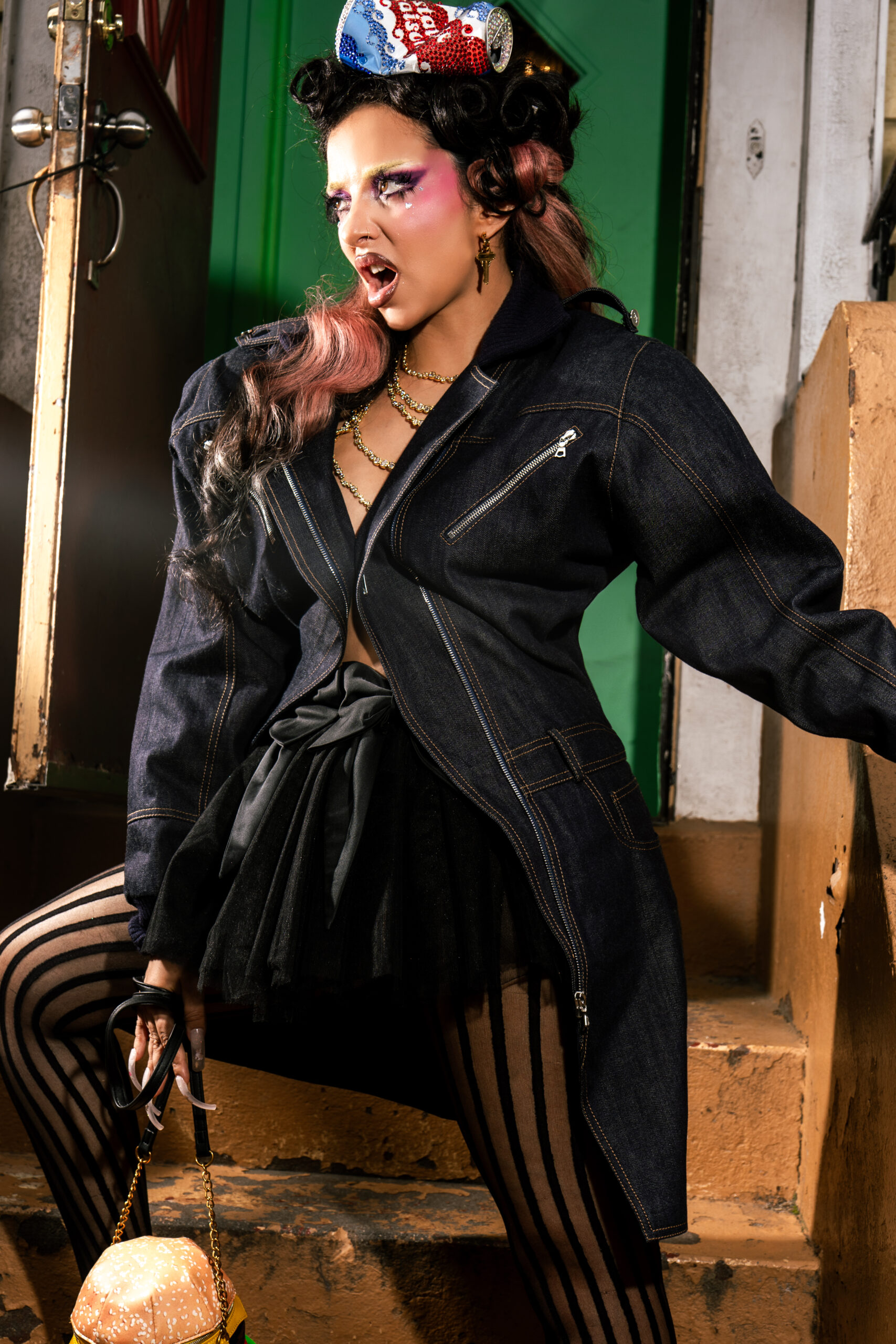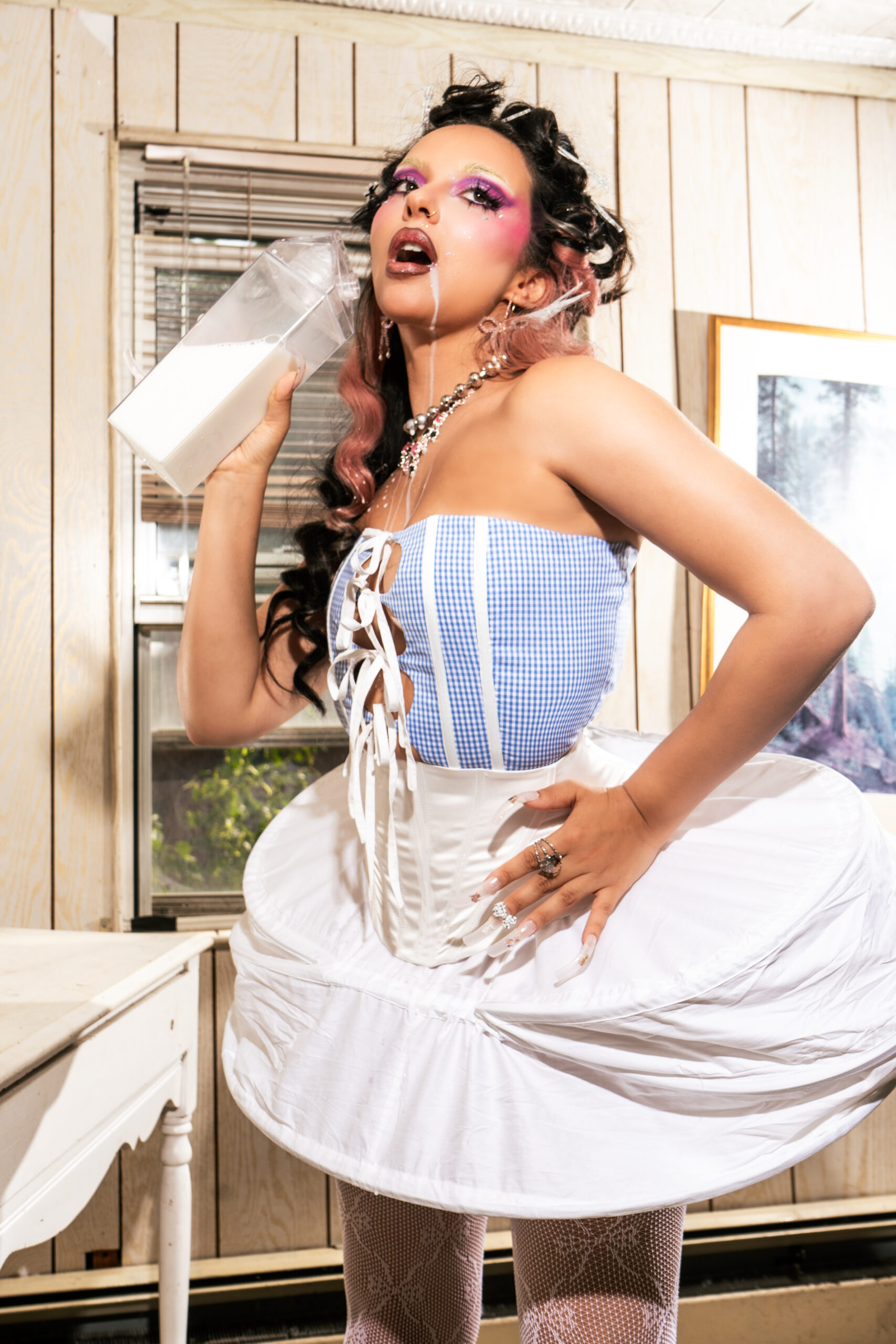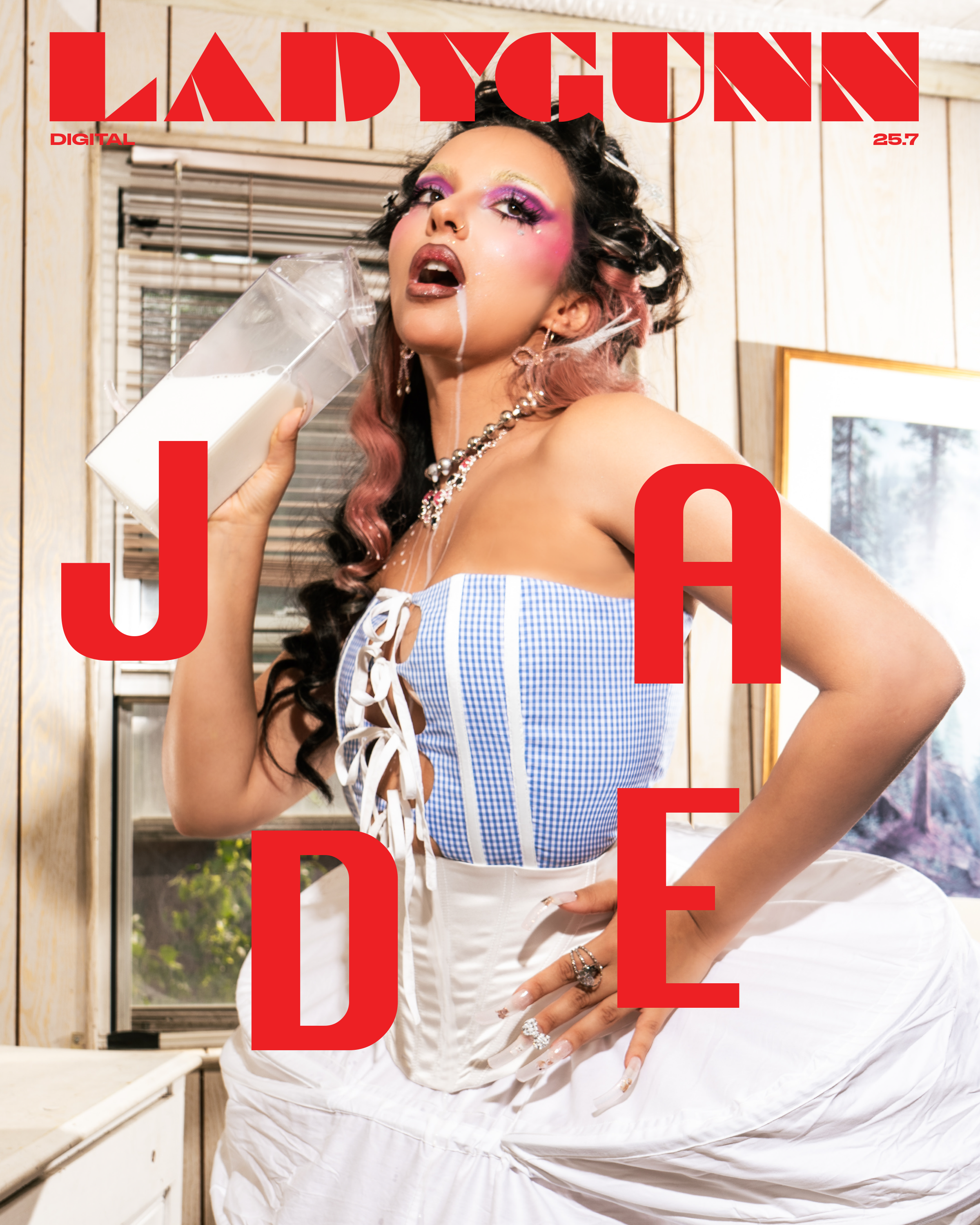
Words / Branden Janese
Photos / Bishop Elegino
Styling / Phil Gomez
MUA / Rory Alvarez
Hair / Isaac Davidson
Nails / Salma
Motion / Alexa San Roman
Styling Assistant / Alon Cameron
JADE moves through conversation the way her music moves through speakers—measured, intentional, magnetic. Every word feels chosen, every pause deliberate. She writes on all her records, and it shows; there’s a precision to her presence, a kindness that never tips into “too much”. What lingers most is the ineffable, an undeniable je ne sais quoi that makes her less an artist you listen to and more a manifestation you experience.
She is a fighter. After fourteen years in the music industry JADE has experienced the cruel realities of record label politics, working with inflated egos, and succumbing to outside influences. Two failed auditions on the television show The X Factor led JADE to being put into Little Mix, with current members, singers Perrie Edwards and Leigh-Anne Pinnock. From 2011-2019 Little Mix went on to become one of the UK’s most successful girlbands in recent history. With Little Mix, JADE released six albums, earned five number one singles, and toured with artists like Demi Lovato and Ariana Grande. — and she still can’t get enough of show business. With her breakout single “Angel of My Dreams,” JADE cemented herself as a pop star fully living the mythology of pop stardom.
JADE is a ham in the best sense and wholly unafraid of the spotlight. Stepping on the edge of a new era with her debut album THAT’S SHOWBIZ BABY! JADE opens up to us about navigating “failure”, the stigma around pop stardom, the devotion of superfans, and the unapologetic hunger that drives her forward.
BRANDEN: The title of your new album, THAT’S SHOWBIZ BABY!, is a saying we have in America, maybe you have it across the pond too, it’s like saying, that’s just how the cookie crumbles. And that’s what it means, right? That’s showbiz baby, or, that’s just the way it goes.
JADE: Yes, correct. I feel like that is how I usually use that. I think especially being in the music industry, I’ve been through a lot, good and bad. That’s showbiz baby is the perfect sugar coating of all the trials and tribulations of this business. I love [using] it for small situations or big ones. The phrase, that’s showbiz baby, like you say it’s that, that’s how it is, deal with it vibe.
BRANDEN: Yea, I agree. That phrase can be very dark or very light, right? I used to work at a documentary production studio and sometimes the lights would burn out while we were shooting. We would have to stop the shoot and grab new lights from downstairs. The producers would say, “that’s showbiz.”
JADE: Yeah it’s got a vast use. I love that about it. The album wasn’t originally called that, it was called something else, which I don’t wanna say in case I use it again. The fans steered me in the that’s showbiz baby direction. It’s a lyric in my song “It Girl.”
Standing up presumably to her fight in the well publicized snafu with Simon Cowell. On “It Girl,” JADE becomes a master of the game, only after being played by it—and that’s how ‘it girls’ are made.
JADE: When I released [“It Girl”] the fans really honed in on that specific lyric (“Throw me them roses/well that’s just showbiz baby.”) My visuals always have that dark undertone of the music industry, I’m always a bit tongue in cheek with it in my experiences.
[The fans] snowballed THAT’S SHOWBIZ BABY!. [They said] “Oh my God, that’s such a good album title.” And I was like, “Yeah, that is a good album title.” So, it naturally evolved into becoming that, thanks to the fans, which I love even more. I love that they pinpointed that out, and they’re right. So much of my music and so much of my visuals are based on showbiz. The dark undertones of [showbiz], the idea that the show must go on [despite] whatever’s going on in your life. I have felt like that for the last fourteen years in the music industry. I love it so much. I also, at times, really resent it. But yeah, that’s showbiz.
BRANDEN: When you’re doing an interview with a musician, they send over all of the press releases and all of the credits for the songs. In the songwriting credits, the person who is named first, does that mean that they contributed most to the writing?
JADE: Not necessarily, I don’t think so. I think it just depends. Sometimes it’s as silly as being in alphabetical order. Sometimes if it’s a huge writer or producer they might put them first just because it looks impressive. I don’t know. I think there’s many reasons for it. I’ve never really thought. I’ve never really delved into that to be honest.
BRANDEN: I’m asking because they sent me the credits for TSB!, and your name is first on all of the songs.
JADE: Well then, yes, that’s why. (Laughs) No, I think that’s just because I’m on every song. I imagine from my team’s perspective it’s good to show people that I do write my own music. Besides maybe one song on the album, it’s very much an equal split in the room. I think the only exception was “Lip Service” but that was because Tove Lo came to me with that song unfinished and then we finished it together. I love collaborating with people.
BRANDEN: Let’s talk about songwriting. To my understanding, this isn’t your first time writing songs, you’ve been songwriting for a long time. What does your process look like?
JADE: It can differ, really. For my own personal music, I write a lot of poetry, sometimes I’ll go into a session with a poem that might spark what the vibe is of the song. I usually know what I want to write about before I go in the room. I think that’s really important, especially when you’re [working] with another writer or you don’t know them that well. It’s good to walk in and know-ish what you want to do. Sometimes I’ll reference other songs as a kind of springboard. It really depends on who you’re working with. A lot of this album I did with Mike Sabbath and Pablo Bowman. Mike works best when you are starting from scratch and he’s on a guitar while we’re figuring out chords together. Then it escalates from there. Especially in pop music, you have to be able to be a bit of a chameleon and read the room and adjust to each room.
“Angel of my Dreams” A brilliant collaboration between JADE and producer Mike Sabath, the lead single is built on the historically unfair treatment and greedy palms that control the music industry. On the record JADE reflects on her contentious relationship with her career. She sounds desperate and crushed until, without notice, the track perks up, introducing an unbothered cunty queen. It’s like watching a news anchor report on a hurricane or a murder with somber and grief, and in two seconds they cheer right back up to break for commercial. JADE released two music videos for “Angel of my Dreams.” One satirical, exaggerated and cheeky, the other a stripped down and sad revelation of a performer tethered to the stage.
JADE: In music, there’s many different egos and personalities. So you have to be good at working around that. Being in Little Mix was very good training for that. We met so many people over the years. Some sessions you love, some you don’t love. For my own music, it was important that I was leading the room and not shrinking too much. I am quite an introverted person. Sometimes in writing rooms there might be a big personality and it’s easy to shrink a little while they’re pushing their ideas or whatever it is.
This whole solo process has been great for me because it’s challenged me to come out of my box and have a bit more confidence in every writing room that I walk into. Which in turn has helped with writing for other artists too, which I also enjoy doing.
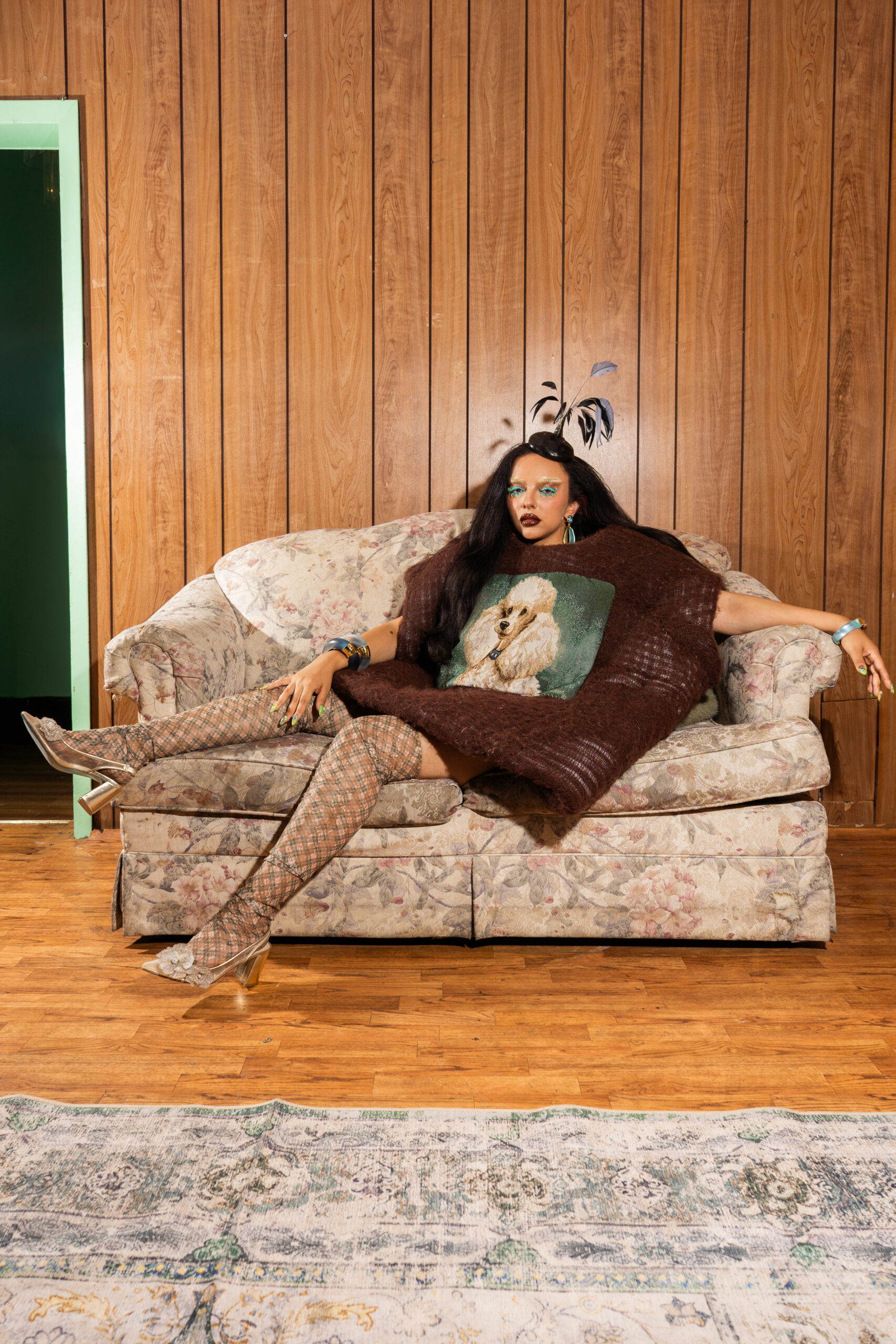
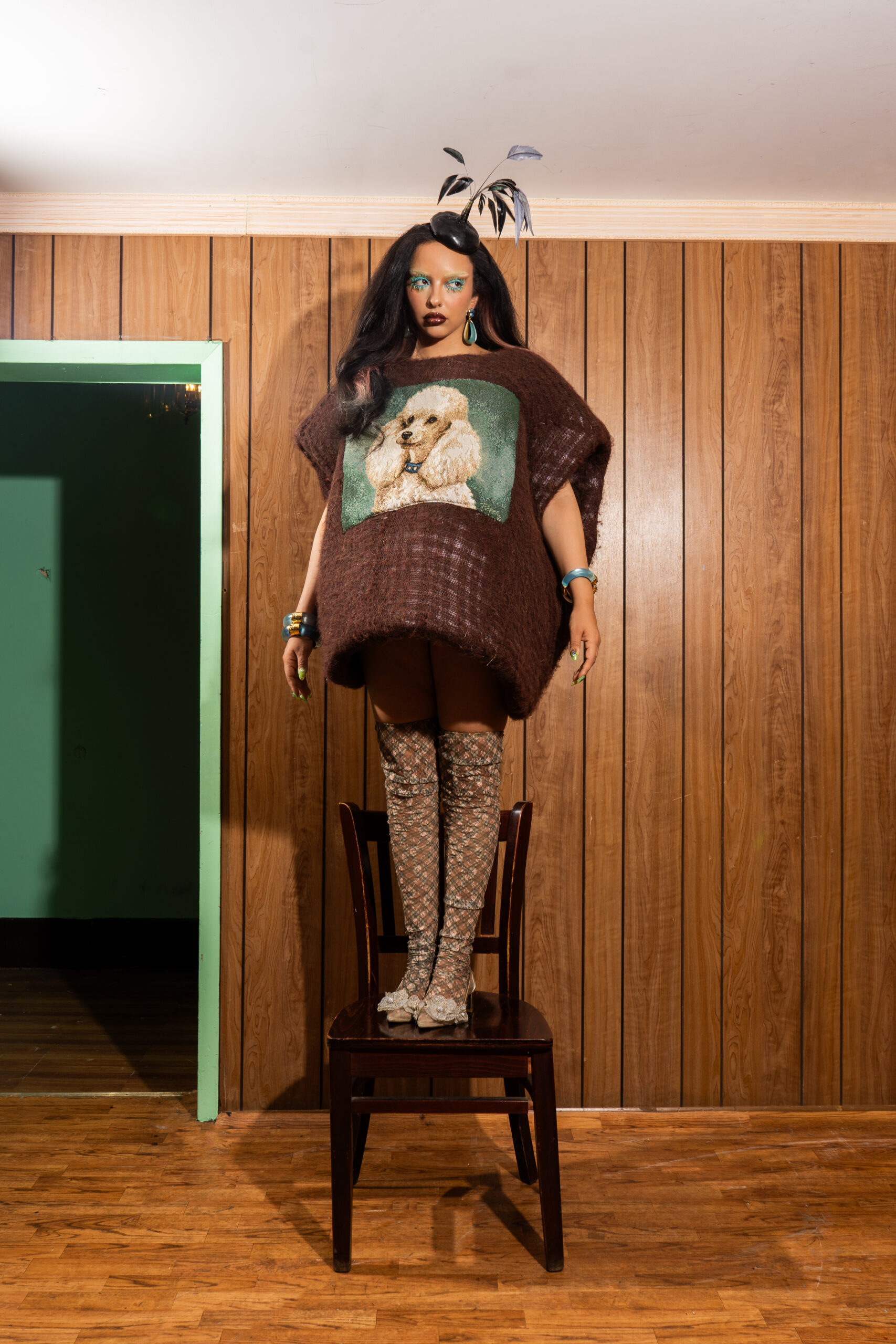
Dress, PIPENCO. Head Piece, SIDEARA. Jewelry, Alexis Bittar. Leg Wear, TAOTTAO. Shoes, BETSEY JOHNSON.
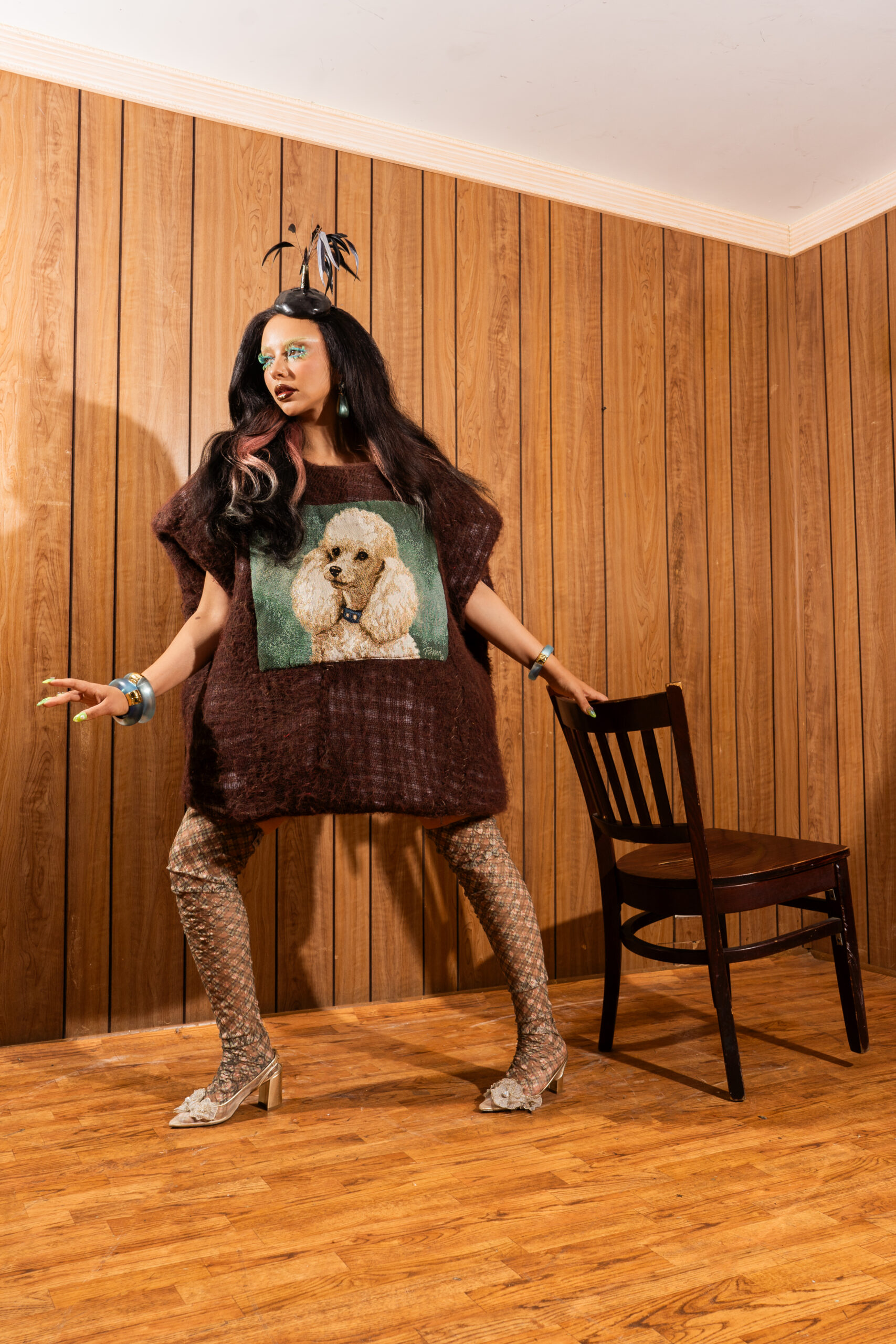
BRANDEN: Have you ever fought for your words or a specific phrase in your songs?
JADE: (Laughs) Definitely. I’ve had a few hairy moments. I don’t work well with big egos. Pop artists can be under appreciated or not respected as a writer. You can go into certain rooms with huge writers, and they’re not expecting you to contribute much, or they’re a bit resentful that you’re in the room, things like that. I only surround myself with people that want to be an equal in that space. I’ve had a few bad sessions. On this record, I had a few sessions with big producers who just didn’t turn up.
BRANDEN: Oh no!
JADE: Yeah, and it’s not that uncommon. Coming out of the band didn’t mean that I was gonna be given all these big opportunities overnight. It’s like starting again and you have to graft for it. Especially in LA. You wanna work with these huge producers but then you finally get the opportunity and you’re like, “Oh you’ve let me down a bit.” You’ve either not shown up or you’ve made me feel like I’ve won some prize by getting to be in the room with you. That’s not how the best music is made. On this record I’ve worked with huge producers like Cirkut who is just the loveliest person you can meet. Being respectful and being kind goes a long way in this industry.
BRANDEN: What do you think is up with the unseriousness of pop music? Why is pop music not taken as seriously as other genres?
JADE: I don’t know. It’s such a gripe of mine because I live and breathe pop music. I always have. I grew up loving Motown and disco. I loved as a child all the big pop girlies like Britney, Christina, Janet Jackson.
I think sometimes we forget that the definition of pop music is literally popular music. I think people snub it because [they] think they’re being really cool by going against the grain by not admitting that they love certain pop songs. And don’t get me wrong, there might be some artists that churn out any old pop song and there’s not a lot of thought behind it. But we all need pop music in our lives. I do think it is a savior at times. During COVID, it was pop music that gave me that release and that sanctuary in dark times. Music is incredibly powerful. Pop music, I don’t know, it’s a weird one. I’m noticing now that pop is coming back fiercely, and I’m really enjoying that. I think there’s a bit more freedom to it at the minute especially with female pop artists. We’re seeing a lot of pop girlies, but they’re all in their own different little lanes, which I think is quite cool.
BRANDEN: Like who?
JADE: We’ve got Chappell, we’ve got Charli, Sabrina. Who else, off the top of my head? Tate McRae. I think what’s nice to see now is there’s room for everyone, and there’s room for everyone to have a very definitive identity.
That excites me because ten years ago, especially being in a girl band, sometimes we were almost like a guilty pleasure, or people didn’t want to admit how much they loved us. We always resented that idea. We wrote our music, we worked incredibly hard, and I don’t see why we shouldn’t be given the same level of respect that someone out of another genre would be given.
BRANDEN: Yeah, I remember watching an NSYNC interview on TRL, or one of those MTV shows back in the early 2000s. They were promoting “This Must Be Pop” from Celebrity.
JADE: Oh yeah, I remember that.
BRANDEN: Justin Timberlake was talking about this idea of pop music always being snubbed for other genres. I remember vividly him saying “if you want to be on the radio, that’s pop music!”
JADE: TEA!
BRANDEN: Right, if you want to be on the radio, if you want any type of audience, you are creating pop music.
JADE: You literally are, yeah. That’s what it is. I feel like with TikTok and with other platforms people are having a bit more of a versatile taste. You can’t deny when a bop comes out and it’s an amazing song.
BRANDEN: Would you describe this album as pop music though?
JADE: Yeah, I would. I think parts of it are slightly more left leaning. Some of it’s hyper pop. I drew a lot of inspiration from Motown [and] disco.
This is a kind of Frankenstein pop record. I am literally discovering who I am on my own. I think you can hear that in the album because there is a bit of everything. In my head, there’s time in the future for albums that are super conceptual or have a running thread. But for [TSB!] I wanted people to listen to it and know that I am experimenting and finding out who I am. But that’s still pop, you know?
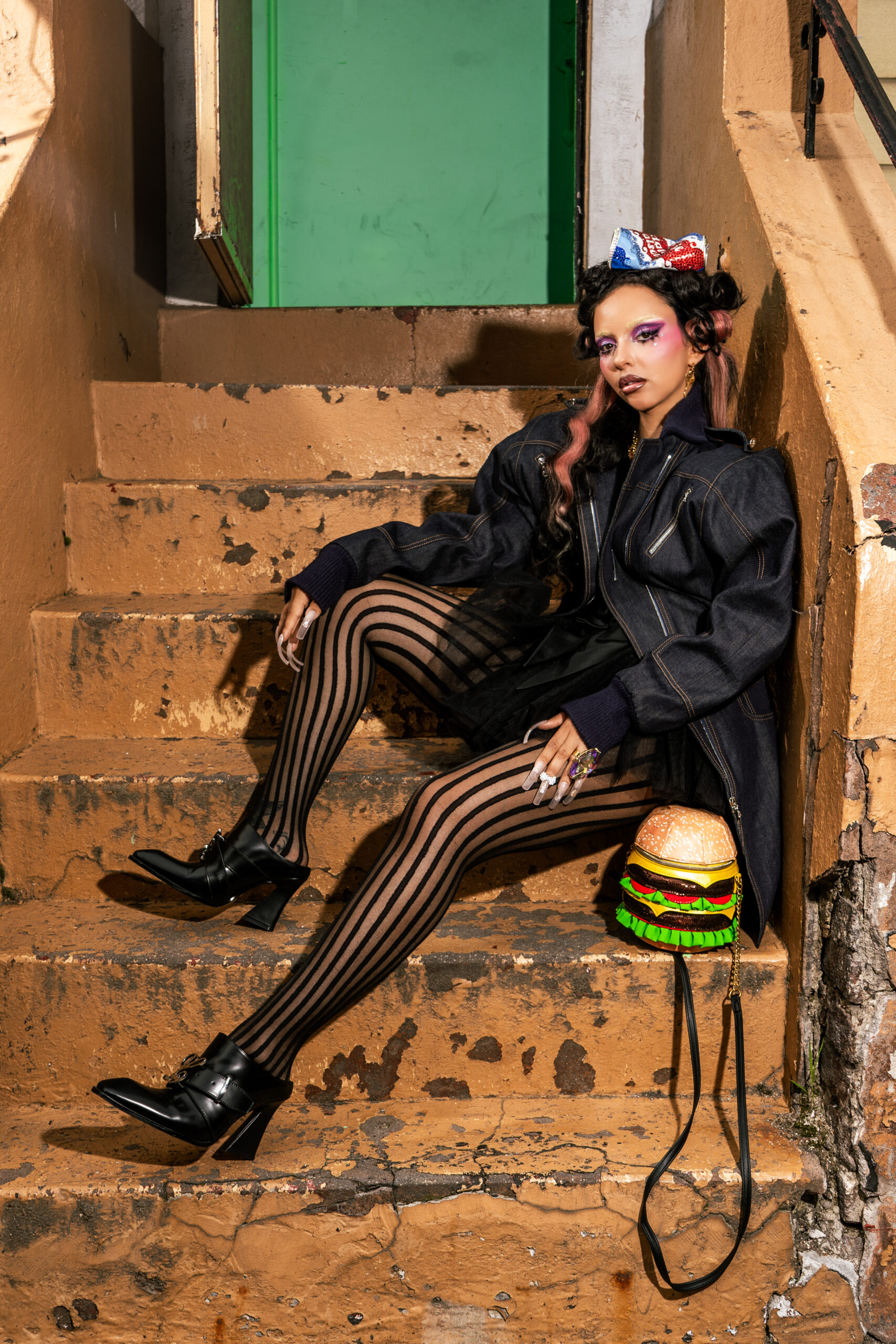
Coat Dress + Shoes, LUAR. Necklace, ALEXIS BITTAR. Earrings, STUDIO CULT. Ring, LARUICCI. Bag, BETSEY JOHNSON. Skirt, WIEDERHOEFT.
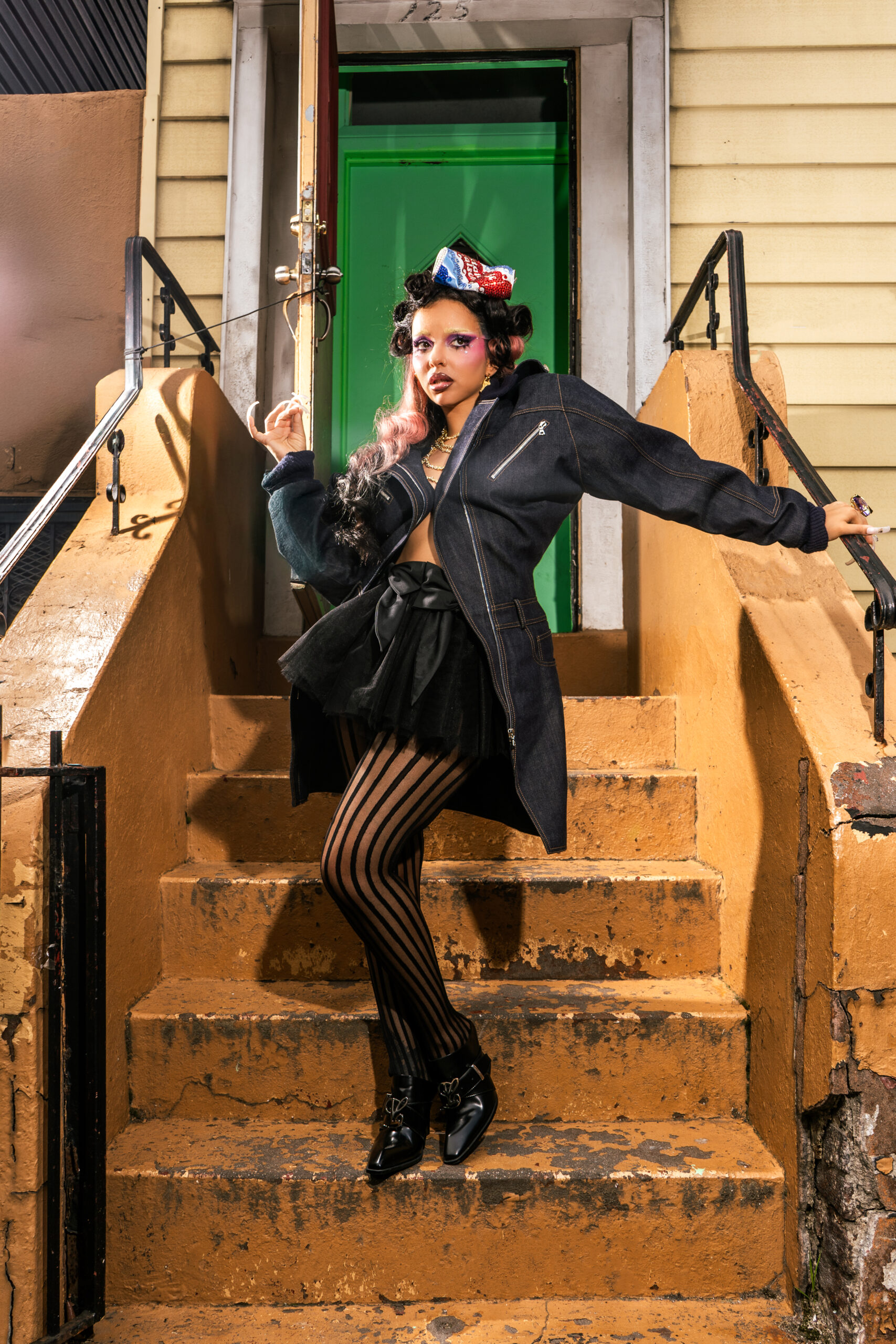
BRANDEN: I wouldn’t describe the album as pop. I would say it’s dance music.
JADE: Yeah, I think there are a lot of dance elements to it. I wouldn’t say all the songs are that, but I know what you mean. I always had that in mind in terms of live [shows], and how the songs would translate. Some of the songs were very different originally, but production-wise we worked on them a lot to get them to the final stage where it was a bit more than just pop. I think it was important as well for me coming from a super pop group to have a point of difference, so it doesn’t just sound like what I’ve done before.
BRANDEN: Yeah, then you get to see different people in the audience too.
JADE: Absolutely, and that’s been really cool for me to see as well. It was all about reaching a new audience. I love now that sometimes on TikTok or whatever I’ll see comments from people that maybe didn’t even know who Little Mix was, but they’re a Jade fan now. That’s so cool to see that I’ve reached that point.
BRANDEN: Yeah, I agree. It’s so hard to start over. It’s incredible. You put yourself in an incredibly vulnerable position, especially after you’ve had success.
I wanted to talk about that idea a little bit. You have such a niche point of view in the music industry. You’ve been in it for so long, way before TikTok, and right at the start of massive social media platforms. Talk to us about failures. Times that you’ve handled failures really well, and times that you didn’t.
JADE: Yeah, I think everyone has failures. I don’t shy away from them. From the beginning of being put in Little Mix, that stemmed from the fear of being told I couldn’t do it as a solo artist. But that was the best decision that was ever made for me. I always see failures as the yes waiting to happen at the right time. Across my career, with the girls especially, we were always so close to breaking it in the US, but we never quite got there. I don’t think that’s necessarily a failure but for multiple reasons that we couldn’t have controlled, it didn’t quite happen. Do I hold resentment for that? Do I blame everybody else? Or do I just think,”Okay, well now I get to try again on my own?” We’ve had many failures across our career, but what do you deem as a failure?
I’ve had to come out of the group as a solo artist and really train my brain to not see anything other than a number one hit as failure. Coming from a show like The X Factor, it was very much like, if you’re not in the top five, you’ve failed. From eighteen years old, that was in my brain— if it’s not huge, if it’s not number one, if I don’t win these awards, I’ve failed and that’s failure. I’m in my thirties now, I feel like failure becomes something else. I’m not chasing charts so much anymore. I’m writing music that I love. That’s success to me. Getting a fan base that I love, selling tickets for my shows. Now, failure would be caving into what others’ opinions want me to do. Does that make any sense?
BRANDEN: Yeah. I have had so many conversations with people about evaluating their failures. Not only what does it look like to fail but also how they’ve handled it. What I’ve noticed is that how I’ve handled a failure is almost more important than winning something.
JADE: Yeah, a hundred percent. Especially in this industry, when you win something, I still don’t really know what it means. Obviously it’s amazing to win awards or get a number one single, blah blah blah. But that doesn’t necessarily better me as a person, whereas my failures will.
However I handle [failure, especially] around the people that I love, is so important. As I’ve matured, I’ll only ever feel failure if I let outside voices in. I’ve noticed that whenever I feel anxious or I get in my own head, like, did I make the right single decision? Is my campaign going well? Like, what’s going on? It’s because I’ve gone online, I’ve looked at negative comments or feedback, which has then made me feel like a failure. That’s important to remember as well, a lot of the time when we see ourselves as a failure, is it really that? Or have you allowed other people to make you think that you failed? I’d agree, it’s how you handle your failures— is a lot more important than how you handle success.
BRANDEN: What’s really interesting is that there are five (really six) singles already out from TSB!: It’s so many. I don’t remember that happening before, someone releasing five singles before the album comes out? Is that the new way that artists are releasing music?
JADE: I think there’s not really any rules anymore with music. I think, because it’s my first record it was important for me to show people different sides to me before the album dropped and get people invested before making the leap to buying an album of mine. Do you know what I mean? So I guess that was the vibe there.
Originally, the album was meant to come out a little earlier, but for various reasons, it got pushed back. I think it’s quite a good thing. I’ve enjoyed seeing new fans come on board with each song. [The fans] are quite different from each other. Someone might love “Fantasy” who wouldn’t necessarily be drawn to “It Girl.” But because they’ve heard that before the album is dropped, they’re [thinking], “Okay, this is something I can still get into.”
It has evolved, anyway. Back when we first were releasing records it would be like one or two singles and an album. There’s not as many rules anymore, which is quite liberating to be honest, [to] not have this rigid structure.
Also, you can drop a song now and if it doesn’t take off, if no one’s feeling it, okay. Whatever. Next one. Do you know what I mean? I like that vibe too. It’s less pressure for artists.
BRANDEN: What are some other changes in the music industry that you have witnessed?
JADE: I’ve witnessed better contracts for artists. I think if you’re a new artist, it’s still quite scary if you’re not familiar with how it all works. Because of social media, the artist has more power now. We’ve seen that a lot over the last few years. For example, Raye was kind of held hostage in her record label contract. She went on social media and documented that turmoil— people wanted to see her win and her fandom fought for her. With Britney as well, again the power of social media. There always will be the big men in the high chairs of, as the big label bosses. [Today,] I think artists have a little bit more power to speak out if something isn’t right without it totally destroying their career. That’s one small positive.
Creative freedom as well. I definitely feel like that for my music now. I’ve got more freedom to put out what I want, and not feel as restricted or like I have to put myself in a certain pop box. So that’s kind of cool.
Fans are always at the forefront of an artist’s success, right? That’s always been the case, especially in pop culture. Fans on social media can literally determine whether you are a successful artist. They can snowball a campaign. They can become your marketing team. I’ve got some diehard fans who have a bigger following than me, and they’ll go on Twitter —X— I always forget it’s called that— and they’ll promote the music, and it’s more powerful than if my team put something out there, which is quite interesting.
BRANDEN: I think they should get paid for that.
JADE: Period. I do reach out to some of the fans. There’s one fan whose art that I love. We’ve had them do some merch pieces for me. We’ve paid fans to help with campaigns in various ways. They are the experts. As super fans they know what they want from an artist. Especially digital teams at labels, a lot of those people have started off as super fans of an artist and then became part of a social media team at a label.
You can’t ever forget the power of a strong fandom. It doesn’t even have to be a huge artist, but if they’ve got a hardcore fan base… I think that’s the case with Charli XCX. She has obviously been about for a long time, always had this super hardcore fan base that has never allowed her to flop. Even when she’s not been commercially successful, she’s always been able to sell tickets. She’s always been respected by those fans. They are the ones that will keep you going when you’re having the dips in your career.
BRANDEN: Yeah, it’s so interesting. I was talking to other writers, and asking if they knew you, and all of them responded, “she’s really big in the UK.”
I remember I had a shirt in high school. When I was in high school, these shirts that had sayings on them were really popular. The quotes would be from Napoleon Dynamite, like in that style. One said, I’m really big in the UK, and I wore it all the time. When people say that, well, I don’t know. What do you think? Have you heard people say that before?
JADE: Yeah, I’ve heard that especially in the US. At the minute I’m one of those artists where people in the US can [say] I’m a fan and I got there first. They’re there at the start before it pops up. I’m not mad at that. I’m just happy that the more and more I come to the US, the more people will recognize me and respect my music. I’m seeing it very slowly evolve and get bigger.
BRANDEN: Is success in the US something you want?
JADE: Yes, yes of course. I love being a pop girly through and through. I love being a pop star. I don’t necessarily love the fame side, but I love when I get recognized in places I don’t usually. That obviously means that it’s working, and the music’s having more of a reach, which again is another blessing and another positive with social media. Now that you’re not restricted by your territory, I love that. I love that people even know who I am.
BRANDEN: I was watching a bunch of your performances in preparation for this interview and all of them were either with the BBC or at one of those massive outdoor festivals in the UK or in Europe somewhere. Do you perform in the US?
JADE: No, I mean, me and the girls did like a couple of support slots. We supported Demi Lovato years ago and then Ariana Grande, which we absolutely loved. We never got to do our own headline shows. It is one of my dreams to do my own shows over there. I don’t care what capacity it is, or how big it is. I just wanna know that I’ve done it for myself. I love performing, that is my favorite thing to do. I love being on stage. In the US, there’s so far to go still. I think that’s exciting. I like the challenge. In the UK, I’ve done some really big festivals over here this summer, and I’ve got my tour this autumn. I’m hoping to do some American shows for sure.
BRANDEN: What’s the difference between American audiences and audiences in the UK?
JADE: Ooh, that’s a good question. When you’re a British artist and someone comes to see you in America, they’re more likely to be super invested fans because they don’t get you all the time. They’re not lucky enough to be able to go and see your shows whenever they want. Do you know what I mean? So I feel like in the US, they’re almost more diehard because they’ve waited for you to be there. Sometimes they’re a bit louder. I don’t know. I feel like in London and LA they’re so spoiled for choice with artists and shows. In LA you can just go to the coffee shop and you might walk past like some huge celebrity. There’s a bit of an expectation there to see stars.
BRANDEN: LA audiences are quiet.
JADE: I’ve noticed that. I’ve only done a few shows in LA but we always would remember that. Sometimes in London, it’s the same way. They’ve got so many artists on their doorstep that they’re like, okay, show me what you got.
BRANDEN: In New York it’s a different vibe because so many people in New York perform in some capacity that, when they go to shows, they’re such tough critics. They’re staring at the stage like, I do this too so show me what you got. It can be daunting performing to an audience full of performers.
JADE: So true. That is so true. I get nervous when I’m in London. I get more nervous because the chances are the people coming to watch you as well are your songwriting friends, or your artist friends, producers, all these people that you actually really want to impress, and that makes you more nervous. Whereas if I do a show in Dublin, I just know they’re all up for a good time, and that’s amazing. You know, there’s less pressure.
BRANDEN: In your Genius interview you break down the lyrics to “Angel of My Dreams.” You said something in that interview that was so interesting to me. You were talking about how the song itself was a love letter to the industry, and how toxic it can be, but how you also are obsessed with it, and obsessed with being a star. I thought that was such a vulnerable thing to say, because so many of us shy away from that, and avoid saying what we want. Like, “I want to be famous, I want to be a star, I want to be a bestseller.” So many people I know shy away from admitting that, from saying it out loud. And especially how you said it, “I’m obsessed with becoming a star.” I’ve met so many people that carry a bit of shame with wanting success. Could talk about that a little more in depth?
JADE: I’ve done this for too long now to not admit that I love it. If I didn’t love it, I wouldn’t still be going. That’s not to say that I don’t despise it sometimes. Sometimes I hate the politics of the music industry. Sometimes I hate that I love it.
When I first started at eighteen, I had no idea what I was in for. I didn’t necessarily want to be famous, I just knew I loved music and I wanted to be on stage. Then I got put in a girl band that exploded, and it became this huge thing. I never necessarily wanted that, but you do become addicted to it. All of a sudden you’ve got people blowing smoke up your arse and telling you how amazing you are and you’re in all the glitz and glamour of it all. All of a sudden, you’ve got a makeup team and styling, and you signed with a big label and you are literally living a pop star dream.
Especially at a young age, how can you not [think], “Oh okay, I love this and how do I hold on to this forever?” I think most artists in pop music should admit that they live for it. You shouldn’t be doing it if you don’t, you know what I mean? The best artists in pop music are the ones that are unashamedly gagging for it. It is a fine line, and that’s why we see so many artists have mental breakdowns or deteriorate or they succumb to it too much. It’s all about striking a healthy balance with it. That’s probably why I’ve kept my sanity for this long. I can go on stage and I can have all the fabulous costumes and love every minute of it, and I’m signing things and I’m loving all that. When I come home, I’m surrounded by my day ones, my family that I’ve always had around me. They would tell me straight away if I had too much of an ego. Whereas I think not everybody has that around them. That is when it escalates into something bad, if you’re surrounded by ‘yes’ people. That’s what I mean in [“Angel of my Dreams”], that toxic relationship. I’d resent sometimes that I’d be working to the bone to make money for people that I don’t even know, I probably haven’t even met. There’s people that run labels that I probably would never even know have benefited from me working so hard.
At the same time, I’m grateful for them because they’ve given me my dream. So, it is a constant conflict, of this love-hate relationship. With “Angel of my Dreams” specifically, it was that whole idea that we were told, “if you don’t do this, somebody else will take your place very easily.” I’ve always had that thought in my mind, if I don’t work all hours of the day, if I don’t graft and keep pushing to be the best I can be, someone will always swoop in and take that spot. When you think of the industry or of labels as the main love of your life, that does become quite toxic.
That’s the whole vibe with “Angel of my Dreams” and with “It Girl.” That’s my lived experience. That’s my truth. For [my] debut single it was important for me to explain that. Until I met Jordan, music was the love of my life. So when I thought about what I should write about, it should be about that. It should be an honest account of that feeling that I’ve had for over a decade. The difference now is that I’m aware of it, whereas I probably wasn’t 10 years ago. I probably wouldn’t have understood why I felt so shit when I’d get home from being on stage in front of thousands of people.
Sometimes, I’d go back to my flat and just sit by myself and be so lonely and sad. Now I’m older and wiser, I think you have power in knowing the game, you know?
BRANDEN: I love this idea that people should admit what they want. I went to see Cowboy Carter when Beyonce was here in New York City. It was pouring rain. It was freezing, even though it was July. Beyonce did not miss one beat. She hit every single note. She’s flying across the sky twice, and she was in all these outfit changes, pouring rain the whole three hours. I wore this mini fur, and it was drenched by the end of the concert. A tour like that is what happens when everybody, not just Beyonce, but everybody on the tour from— the people who do the lights and the people who manage all of the mechanics, all of the dancers, every last one of the musicians, including the stand-ins— is obsessed. Obsessed with being the best at whatever they are in that industry, either the pop star or the person that does the audio or the person that makes sure that the video is going straight.
JADE: It’s true. That is why Beyonce is the best performer in the world right now. She loves it and she lives for it. She’s given her whole life to becoming Beyonce. You’re right, everyone around her has that ambition too. I wouldn’t have anyone on my team that doesn’t have the drive or ambition that I do. I’m not interested in having anyone around me that doesn’t think this will be huge or doesn’t believe that I can become greater and greater. It’s important, you’ve got to have that energy around you. You’ve got to surround yourself with talented people who you don’t see a ceiling. I’m sure Beyonce has been surrounded by that, and anyone that hasn’t been like that, she’s got rid of.
BRANDEN: You said that you had worked on TSB! for years, are you working on anything else right now?
JADE: Yes. I’ve lived with a lot of this music for some time now. So creatively, I have to be writing new stuff. I would love to have another record out by summer next year. So that means getting in the studio now and getting that done and ready. I’m already thinking of the future and what does the second record look like, what would the next era be like. As a huge pop student, I’ve always loved the artists that can really switch it up with each era. You look at a picture of them and you can really identify what album that was from. I really want to give that energy.
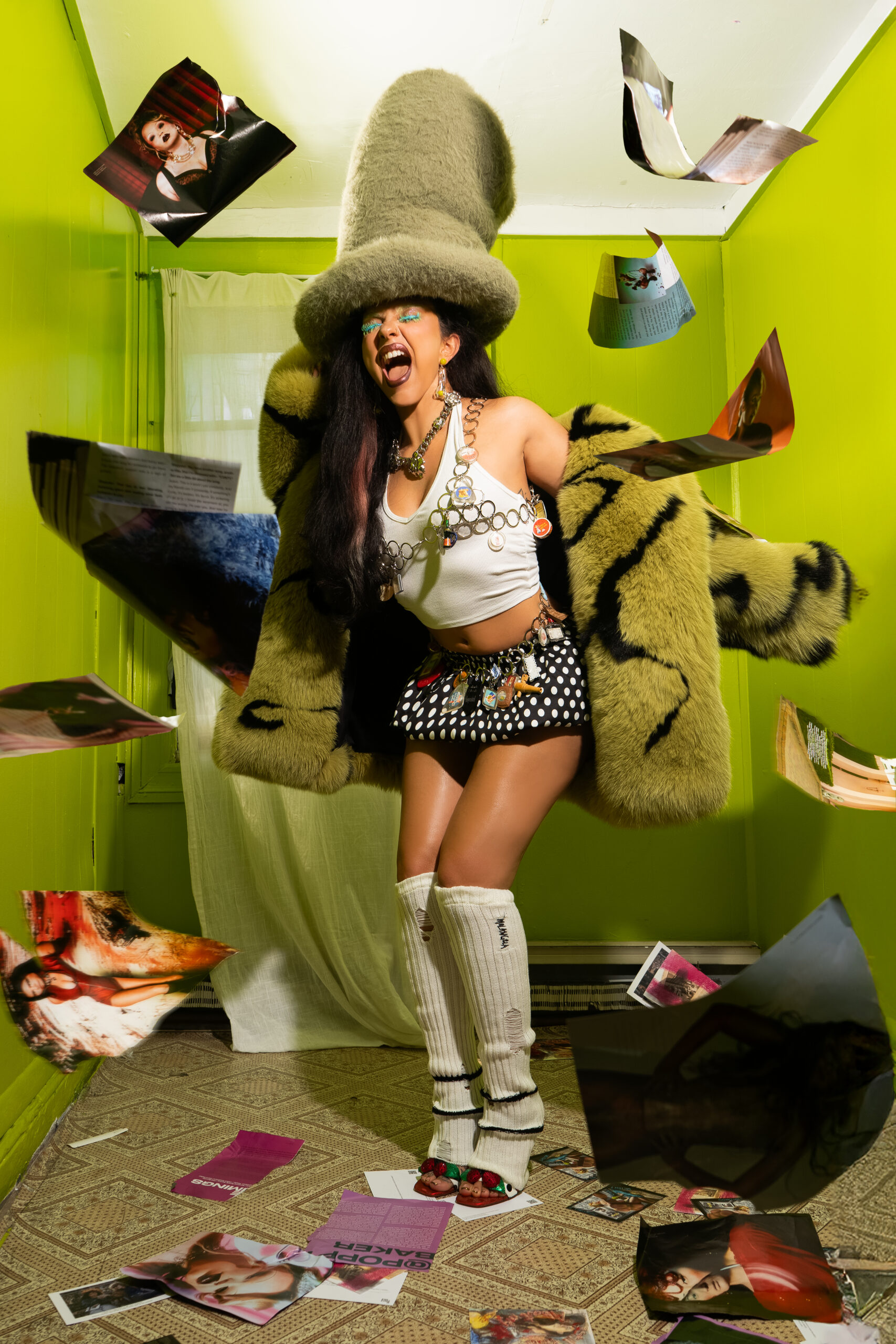
Coat, LAPOINTE. Hat, PIPENCO. Earrings, KEANE. Necklace, LARUICCI. Charm Bralette and Belt, J. SIMONE @ap0cene. Skirt, BLONDITA @ap0cene. Shoes, BETSEY JOHNSON.
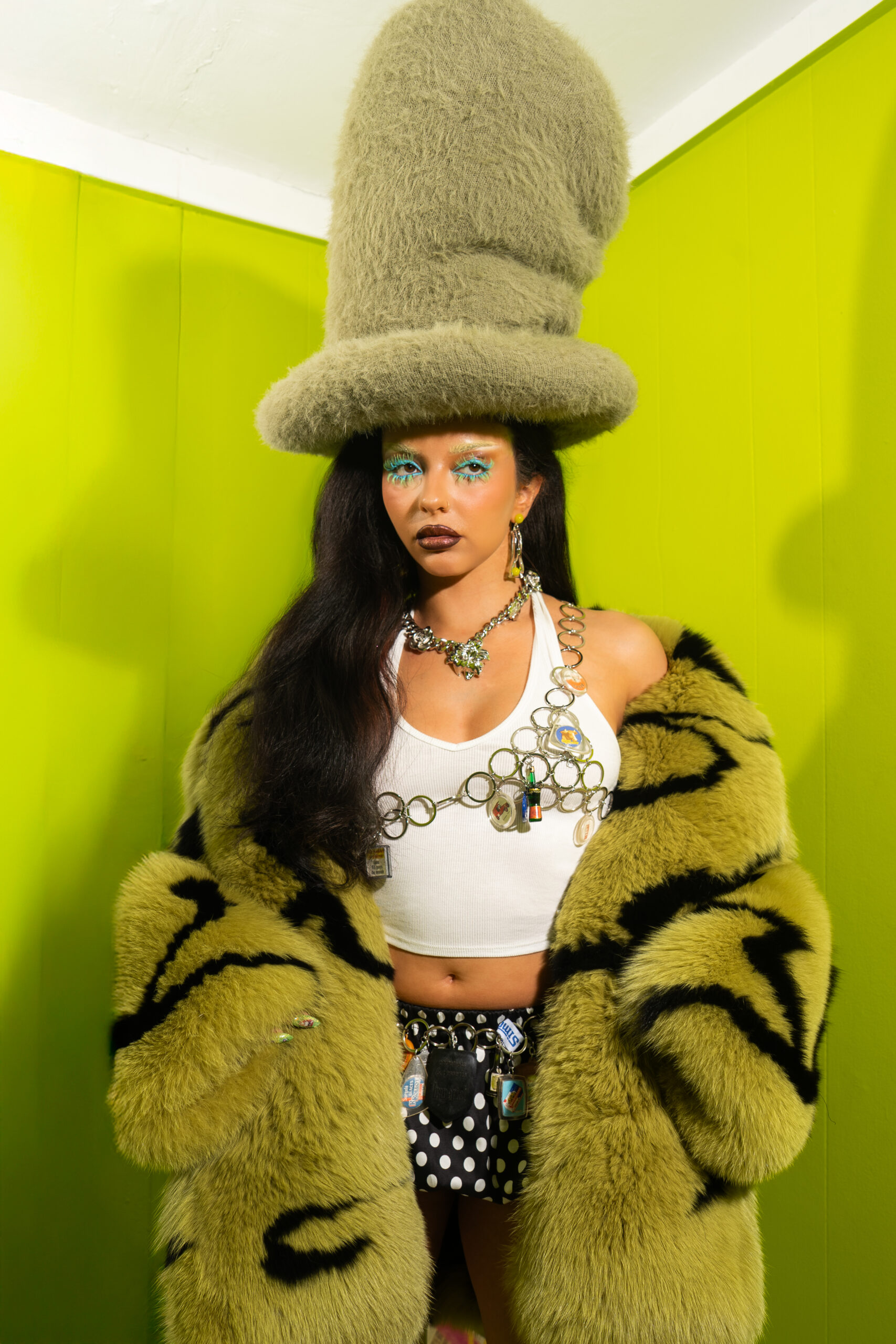
BRANDEN: Who do you think about when you think about eras?
JADE: I think Britney, Madonna, Christina. I know people focus so much on the first record, and obviously this is my debut and it means the world to me. But sometimes it’s the second or third album that really gets people going. I’m thinking Christina with Stripped and Britney [with] Blackout.
BRANDEN: Blackout was such a great album. It was a flop here.
JADE: Which is just crazy.
BRANDEN: It was her best album, period, hands down.
JADE: It was ahead of its time. I feel the same with Christina’s Bionic album. It was too clever for its own good. Now we look back at those records, like, oh my God, that was phenomenal.
BRANDEN: No, I totally agree.
JADE: That’s the thing as well that I always remember. Again thinking of success, is it doesn’t always have to happen overnight or straight away. Songs can have their moment years later. Just put out what you love, and when it’s meant to rise to the top, it will. I think about Madonna’s Ray of Light era, it was just so sick for me. It’s one of my favorites.
BRANDEN: Is that the one that was like (sings), ‘And I feel like I just got home?’
JADE: Yeah.
BRANDEN: I remember that in middle school. That was a big time.
JADE: Yeah, and she was in a little bit of a cowgirl vibe as well. I feel like every pop icon has a cowgirl era.
BRANDEN: If you think about it, it’s essential to pop music. That idea, not necessarily the country music genre, but definitely that idea of showmanship, which is engrained in the cowboy culture. Every pop girlie has that.
JADE: Every pop girlie. Or, they have the showgirlie vibe, like with Britney and Circus.
BRANDEN: Which was a great album.
JADE: So good, and again, under appreciated. I’m very inspired by those artists and their reinventions. That’s what makes for a long career. That’s why Madonna can still tour, Kylie still tours, Janet Jackson. They’ve managed to have that longevity. That’s goals for me.
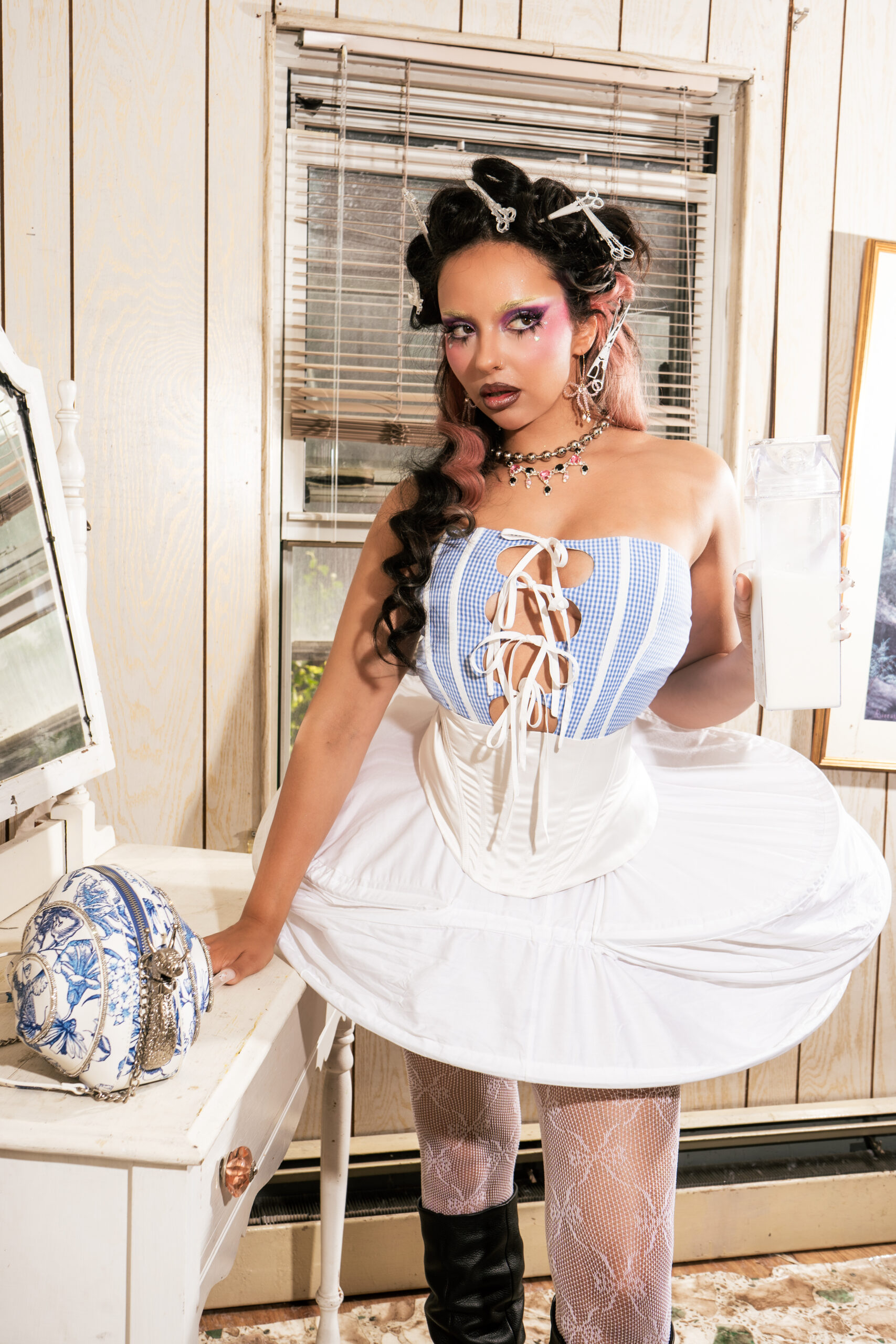
Top, ALLINA LIU. Corset, SELINE MEISLER. Necklace, HARLOT HANDS @ap0cene. Skirt, Hair Clips, SIDEARA. Ring, STUDIO CULT. Earrings + Bag, BETSEY JOHNSON. Boots, DR. MARTENS.
